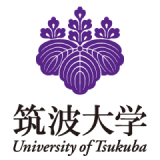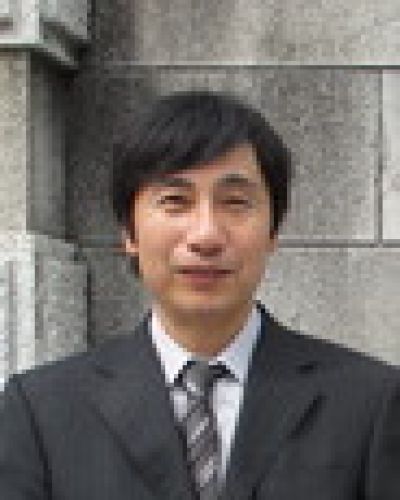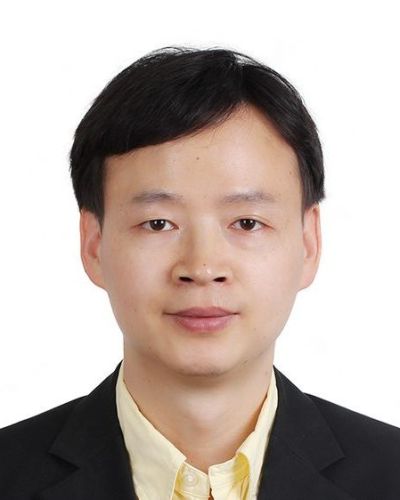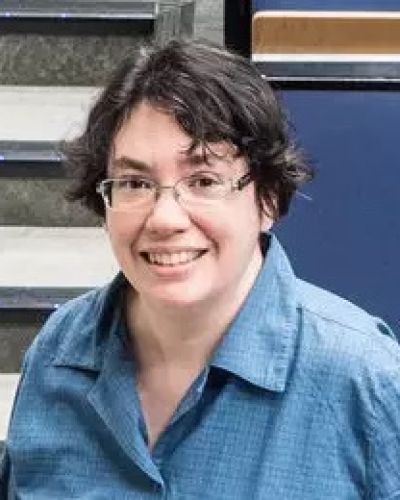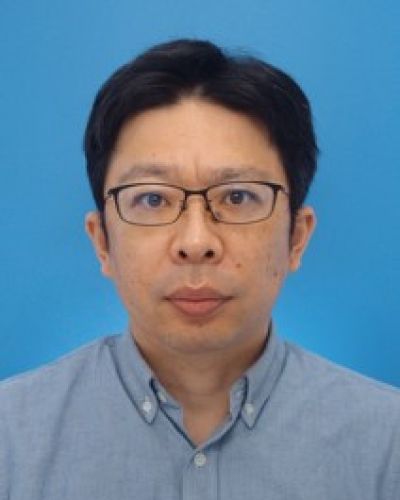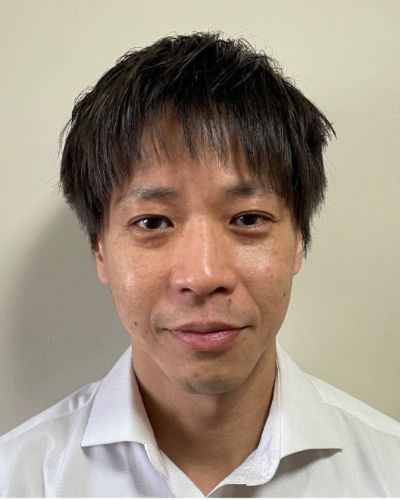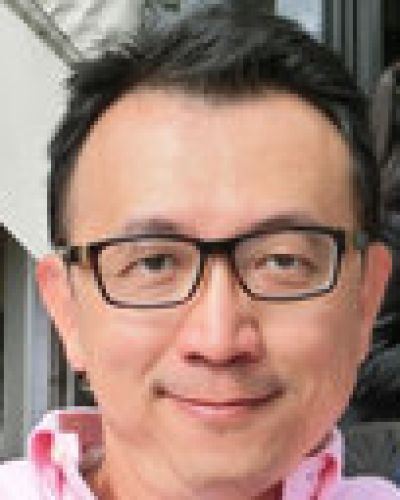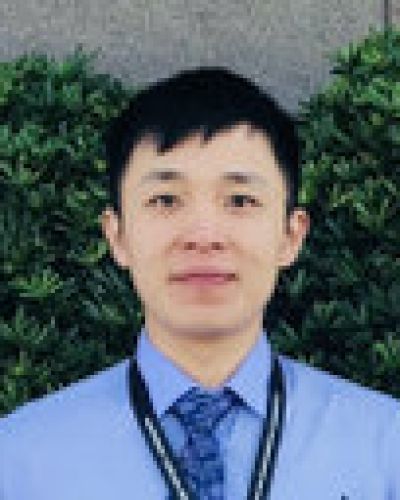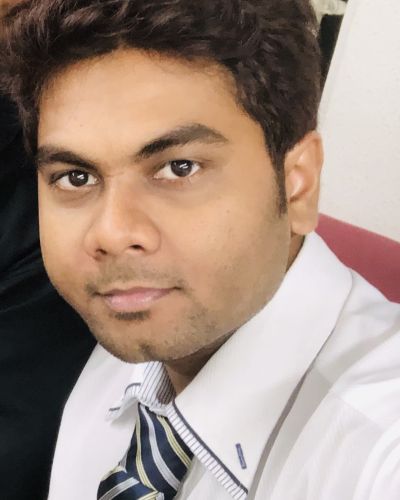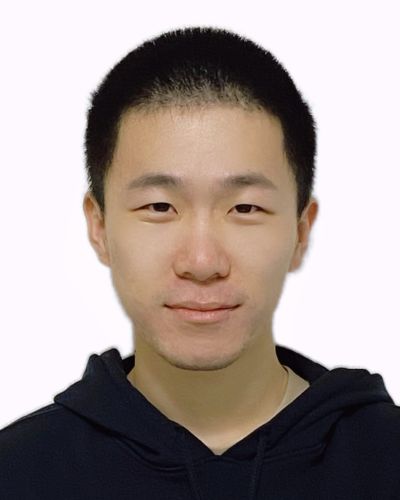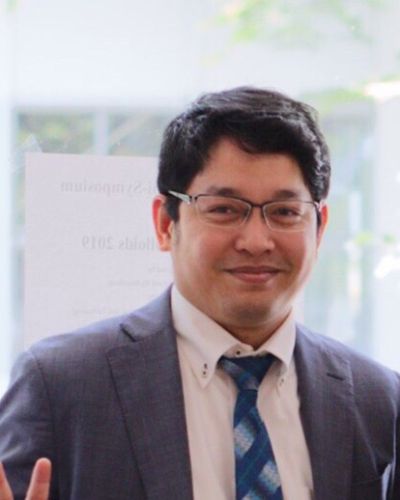|
|
Name of session: Bio-Flocculation and Smart Sludge for Soil Improvement in the category of joint University of Tsukuba and Kenkyu Gakuen City. This Session is composed of five sub-sessions.
Name of session: Bio-Flocculation and Smart Sludge for Soil Improvement in the category of joint University of Tsukuba and Kenkyu Gakuen City. This Session is composed of five sub-sessions.
|
|
|
|
|
Convener
司会・進行
|
Yuji Yamashita
山下 祐司
|
University of Tsukuba
筑波大学
|
|
|
9/26
9/26
|
|
|
|
|
1. Digital summer school (basically each G (Grope) use 30 min) 13:00 - 15:30
1.デジタルサマースクール 13:00 - 15:30
|
Chair Hongtao Wang, Hideyuki Sugioka
座長 ワン ホンタオ、杉岡 秀行
|
Tongji University, Shinshu University
Tongji University、信州大学
|
|
13:00 - 13:30 |
Hideyuki Sugioka Group (Shinshu University, Complex thermal fluid Lab.)
Hideyuki Sugioka Group (Shinshu University, Complex thermal fluid Lab.)
|
|
Shinshu University
信州大学
|
|
|
Approach from the electric and thermal interface for environment and healthcare
Approach from the electric and thermal interface for environment and healthcare
|
Hideyuki Sugioka
杉岡 秀行
|
Shinshu University
信州大学
|
|
|
Water problem:
Water problem:
|
|
|
|
|
1) Spiral light-driven BL pump for water problem
1) Spiral light-driven BL pump for water problem
|
Hiroki Yoshijima, Hideyuki Sugioka
Hiroki Yoshijima, Hideyuki Sugioka
|
Shinshu University
信州大学
|
|
|
Healthcare:
Healthcare:
|
|
|
|
|
2) Fluidic switch using ICEO for healthcare
2) Fluidic switch using ICEO for healthcare
|
Shunsuke Takahashi, Hideyuki Sugioka
Shunsuke Takahashi, Hideyuki Sugioka
|
Shinshu University
信州大学
|
|
|
3) Vector separator using ICEO for healthcare
3) Vector separator using ICEO for healthcare
|
Ryo Takeda, Hideyuki Sugioka
Ryo Takeda, Hideyuki Sugioka
|
Shinshu University
信州大学
|
|
|
Use of waste heat:
Use of waste heat:
|
|
|
|
|
4) Bubble water pump using oblique structures for the use of waste heat
4) Bubble water pump using oblique structures for the use of waste heat
|
Atsushi Miyauchi, Hideyuki Sugioka
Atsushi Miyauchi, Hideyuki Sugioka
|
Shinshu University
信州大学
|
|
|
Micro actuator:
Micro actuator:
|
|
|
|
|
5) Micro rotary engine for microrobot
5) Micro rotary engine for microrobot
|
Yuki Arai, Hideyuki Sugioka
Yuki Arai, Hideyuki Sugioka
|
Shinshu University
信州大学
|
|
|
6) Side-shooter using discharge
6) Side-shooter using discharge
|
Katsuaki Murata, Hideyuki Sugioka
Katsuaki Murata, Hideyuki Sugioka
|
Shinshu University
信州大学
|
|
|
7) Hydrodynamic interaction between thermal cilia
7) Hydrodynamic interaction between thermal cilia
|
Wataru Tomita, Hideyuki Sugioka
Wataru Tomita, Hideyuki Sugioka
|
Shinshu University
信州大学
|
|
|
8) Weaving technique for ICEO carbon actuators
8) Weaving technique for ICEO carbon actuators
|
Hiroya Nakamura
Hiroya Nakamura
|
Shinshu University
信州大学
|
|
13:30 - 14:00 |
Yasuhisa Adachi Group
Yasuhisa Adachi Group
|
|
University of Tsukuba
筑波大学
|
|
|
13:30-13:45 Particle-induced aggregation by adsorption of oppositely charged small particles
13:30-13:45 Particle-induced aggregation by adsorption of oppositely charged small particles
|
Lifan Duan
Lifan Duan
|
University of Tsukuba
筑波大学
|
|
|
13:45-14:00 Effects of pH and dosage of polyaluminium chloride on initial-stage kinetics of flocculation of polystyrene latex particles
13:45-14:00 Effects of pH and dosage of polyaluminium chloride on initial-stage kinetics of flocculation of polystyrene latex particles
|
Zheng Ju
Zheng Ju
|
University of Tsukuba
筑波大学
|
|
14:00 - 14:30 |
Motoyoshi Kobayashi Group
Motoyoshi Kobayashi Group
|
|
University of Tsukuba
筑波大学
|
|
|
14:00-14:15 Strength of Floc of Leonardite Humic Acid with Cationic Polyelectrolytes
14:00-14:15 Strength of Floc of Leonardite Humic Acid with Cationic Polyelectrolytes
|
Yue Lyu
Yue Lyu
|
University of Tsukuba
筑波大学
|
|
|
14:15-14:30 Effect of lysozyme on the aggregation and charging of oxidized carbon nanohorn (CHNox) in aqueous solution
14:30-14:45 Effect of lysozyme on the aggregation and charging of oxidized carbon nanohorn (CHNox) in aqueous solution
|
Zhengjian Tian
Zhengjian Tian
|
University of Tsukuba
筑波大学
|
|
14:30 - 15:00 |
Hongtao Wang Group
Hongtao Wang Group
|
|
UNEP Tongji University
UNEP Tongji University
|
|
|
14:30-14:40 Introduction to Laboratory of Environmental System Engineering
14:30-14:40 Introduction to Laboratory of Environmental System Engineering
|
Hongtao Wang
Hongtao Wang
|
UNEP Tongji University
UNEP Tongji University
|
|
|
14:40-14:45 The influence of humic substances on environmental behavior of antibiotic resistance genes
14:40-14:45 The influence of humic substances on environmental behavior of antibiotic resistance genes
|
Bomin Fu
Bomin Fu
|
UNEP Tongji University
UNEP Tongji University
|
|
|
14:45-14:50 Enhancement of sludge dewaterability by electrolysis coupled with peroxymonosulfate oxidation process: Performance, mechanisms and implications
14:45-14:50 Enhancement of sludge dewaterability by electrolysis coupled with peroxymonosulfate oxidation process: Performance, mechanisms and implications
|
Junsen Wang
Junsen Wang
|
UNEP Tongji University
UNEP Tongji University
|
|
|
14:50-14:55 Insight into advanced oxidation processes for the degradation of fluoroquinolone antibiotics: Removal, mechanism, and influencing factors
14:50-14:55 Insight into advanced oxidation processes for the degradation of fluoroquinolone antibiotics: Removal, mechanism, and influencing factors
|
Zonglin Li
Zonglin Li
|
UNEP Tongji University
UNEP Tongji University
|
|
|
14:55-15:00 Discussion (Q&A)
14:55-15:00 Discussion (Q&A)
|
Hongtao Wang
Hongtao Wang
|
UNEP Tongji University
UNEP Tongji University
|
|
15:00 - 15:30 |
Zhongfang Lei Group
Zhongfang Lei Group
|
|
University of Tsukuba
筑波大学
|
|
|
Introduction to Laboratory of Bioresource Process Engineering
Introduction to Laboratory of Bioresource Process Engineering
|
Zhongfang Lei
Zhongfang Lei
|
University of Tsukuba
筑波大学
|
|
|
A comparative study on simultaneous recovery of phosphorus and alginate-like exopolymers from bacterial and algal-bacterial aerobic granular sludges: Effects of organic loading rate
A comparative study on simultaneous recovery of phosphorus and alginate-like exopolymers from bacterial and algal-bacterial aerobic granular sludges: Effects of organic loading rate
|
Xingyu Chen
Xingyu Chen
|
University of Tsukuba
筑波大学
|
|
|
Stable and high-efficacy nitrogen removal from wastewater by algal-bacterial aerobic granular sludge under no mechanical aeration
Stable and high-efficacy nitrogen removal from wastewater by algal-bacterial aerobic granular sludge under no mechanical aeration
|
Zejiao Li
Zejiao Li
|
University of Tsukuba
筑波大学
|
|
|
Carbon fixation and heavy metal adsorption by soil particles supplemented with microalgal-bacterial granules
Carbon fixation and heavy metal adsorption by soil particles supplemented with microalgal-bacterial granules
|
Xiaochuan Dong
Xiaochuan Dong
|
University of Tsukuba
筑波大学
|
|
|
Wastewater treatment by microalgal-bacterial granules under heavy metal inhibition and its sustainable solutions
Wastewater treatment by microalgal-bacterial granules under heavy metal inhibition and its sustainable solutions
|
Yankai Zhao
Yankai Zhao
|
University of Tsukuba
筑波大学
|
|
15:30 - 16:00 |
30 min break
30 min break
|
|
|
|
|
2. Colloids in Civil and Environmental Eng. 16:00 - 18:40
2.Colloids in Civil and Environmental Eng. 16:00 - 18:40
|
Chair Motoyoshi Kobayashi
座長 小林幹佳
|
University of Tsukuba
筑波大学
|
|
16:00 - 17:00 |
Plenary lecture
Plenary lecture
|
|
|
|
|
Bio-flocculation and applications in Smart Soils
Bio-flocculation and applications in Smart Soils
|
Dr. Claire Chassagne
Dr. Claire Chassagne
|
TU Delft
TU Delft
|
|
17:00 - 17:30 |
Takashi Matsushima Group (Project & Graduate Study)
Takashi Matsushima Group (Project & Graduate Study)
|
|
University of Tsukuba
筑波大学
|
|
|
17:00-17:05 Role of granular mechanics in civil and environmental engineering
17:00-17:05 Role of granular mechanics in civil and environmental engineering
|
Takashi Matsushima
松島 亘志
|
University of Tsukuba
筑波大学
|
|
|
17:05-17:15 3D grain shape evolution during rotating drum abrasion experiment
17:05-17:15 3D grain shape evolution during rotating drum abrasion experiment
|
Opu Chandra Debnath
Opu Chandra Debnath
|
University of Tsukuba
筑波大学
|
|
|
17:15-17:25 DEM-SPH coupling for simulating complex erosion/sedimentation process
17:15-17:25 DEM-SPH coupling for simulating complex erosion/sedimentation process
|
Haoran Jiang
Haoran Jiang
|
University of Tsukuba
筑波大学
|
|
|
17:25-17:30 Discussion (Q&A)
17:25-17:30 Discussion (Q&A)
|
Takashi Matsushima
松島 亘志
|
University of Tsukuba
筑波大学
|
|
17:30 - 18:30 |
Key note lecture on Fundamental Colloid
Key note lecture on Fundamental Colloid
|
|
|
|
|
17:30-17:50 Adsorption kinetics of polyelectrolytes onto a silica particle in a unidirectional flow field studied using microfluidics and optical tweezers
17:30-17:50 Adsorption kinetics of polyelectrolytes onto a silica particle in a unidirectional flow field studied using microfluidics and optical tweezers
|
Lester C. Geonzon
Lester C. Geonzon
|
The University of Tokyo
東京大学
|
|
|
17:50-18:10 Poly(ethylene oxide) (PEO) Adsorption on Polystyrene Sulfate (PS) Latex: An Electrophoretic Analysis
17:50-18:10 ポリスチレンサルフェート(PS)ラテックスへのポリエチレンオキシド(PEO)吸着:電気泳動法による解析
|
Santanu SAHA
サハ サンタヌ
|
University of Tsukuba
筑波大学
|
|
|
18:10-18:30 The effect of diverse ion species on the charging and aggregation of natural allophane particles
18:10-18:30 The effect of diverse ion species on the charging and aggregation of natural allophane particles
|
Maolin Li
Maolin Li
|
University of Tsukuba
筑波大学
|
|
18:30 - 18:40 |
Closing Remarks
Closing Remarks
|
Prof. Hiroyuki Ohshima
大島 広行
|
Tokyo University of Science
東京理科大
|
|
|
(This excess time can be managed by the extension)
(This excess time can be managed by the extension)
|
|
|
|
|
9/27
9/27
|
|
|
|
|
3. NARO & Industrial and Agriculture Session 13:00-15:15
3.NARO & Industrial and Agriculture Session 13:00-15:15
|
Chair Teruhito Miyamoto
座長 宮本輝仁
|
NARO
農研機構
|
|
13:00 - 13:30 |
Biochar: sorption mechanism and its application for agriculture
Biochar: sorption mechanism and its application for agriculture
|
Koji Kameyama
亀山 幸司
|
Institute for Rural Engineering, NARO
農研機構
農村工学研究部門 農地基盤情報研究領域 農地整備グループ
|
|
13:30 - 14:00 |
Development of Sensors that Detect the Coagulation State of Flocs for Controlling the Coagulant Dose -Streaming Current Sensor and Image Processing Coagulation Sensor-
Development of Sensors that Detect the Coagulation State of Flocs for Controlling the Coagulant Dose -Streaming Current Sensor and Image Processing Coagulation Sensor-
|
Mii Fukuda
福田 美意
|
Toshiba Infrastructure Systems & Solutions Corporation
東芝インフラシステムズ株式会社
|
|
14:00 - 14:45 |
Chihhao Fan & Shu-Yuan Pan Group
Chihhao Fan & Shu-Yuan Pan Group
|
|
Department of Bioenvironmental Systems Engineering, National Taiwan University, Taiwan
台湾大学
|
|
|
14:00-14:20 Strategies on source control for fertilizer non-point source pollution mitigation in Agricultural Farmlands
14:00-14:20 Strategies on source control for fertilizer non-point source pollution mitigation in Agricultural Farmlands
|
Chihhao Fan
Chihhao Fan
|
Department of Bioenvironmental Systems Engineering, National Taiwan University, Taiwan
台湾大学
|
|
|
14:20-14:40 Green Technology Lab at NTU https://homepage.ntu.edu.tw/~sypan/Default.html
14:20-14:40 Green Technology Lab at NTU https://homepage.ntu.edu.tw/~sypan/Default.html
|
Shu-Yuan Pan
Shu-Yuan Pan
|
Department of Bioenvironmental Systems Engineering, National Taiwan University, Taiwan
台湾大学
|
|
|
14:40-14:45 Discussion (Q&A)
14:40-14:45 Discussion (Q&A)
|
Shu-Yuan Pan
Shu-Yuan Pan
|
Department of Bioenvironmental Systems Engineering, National Taiwan University, Taiwan
台湾大学
|
|
14:45 - 15:15 |
Shoichiro Hamamoto Group
Shoichiro Hamamoto Group
|
|
The University of Tokyo
東京大学
|
|
|
14:45-14:50 Lab of Soil Physics and Soil Hydrology at UoT
14:45-14:50 Lab of Soil Physics and Soil Hydrology at UoT
|
Shoichiro Hamamoto
濱本 昌一郎
|
The University of Tokyo
東京大学
|
|
|
14:50-15:00 Seasonal variations in methane emissions via plant and ebullition from rice paddies
14:50-15:00 Seasonal variations in methane emissions via plant and ebullition from rice paddies
|
Tatsuya Kobayakawa
小早川 竜也
|
The University of Tokyo
東京大学
|
|
|
15:00-15:10 Effects of cation exchange on colloid transport in saturated porous media
15:00-15:10 Effects of cation exchange on colloid transport in saturated porous media
|
Rikutaro Higashi
東 陸太郎
|
The University of Tokyo
東京大学
|
|
|
15:10-15:15 Discussion (Q&A)
15:10-15:15 Discussion (Q&A)
|
Shoichiro Hamamoto
濱本 昌一郎
|
The University of Tokyo
東京大学
|
|
15:15 - 15:30 |
15min Break
15min Break
|
|
|
|
|
4. Asian students and young researcher session 15:30 - 17:00
4.Asian students and young researcher session 15:30 - 17:00
|
Chair Akiko Nakagawa, Oviyanti Mulyani, Toshiharu Enomae
座長 中川明子、オビヤンティ
|
University of Tsukuba,
Universitas Padjajaran
Universitas Padjajaran、筑波大学
|
|
15:30 - 15:45 |
Utilization of Adsorbent from Organic Matter in Reducing Heavy Metal Levels
Utilization of Adsorbent from Organic Matter in Reducing Heavy Metal Levels
|
Oviyanti Mulyani
Oviyanti Mulyani
|
Universitas Padjajaran
Universitas Padjajaran
|
|
15:45 - 16:00 |
Lignocellulose Biomass Utilization as Soil Conditioners
Lignocellulose Biomass Utilization as Soil Conditioners
|
Nadia N. Kamaluddin
Nadia N. Kamaluddin
|
Universitas Padjajaran
Universitas Padjajaran
|
|
16:00 - 16:15 |
Bio-mediated flocculation of cohesive sediment and microalga in different growth phases
Bio-mediated flocculation of cohesive sediment and microalga in different growth phases
|
Que Nguyen Ho
Que Nguyen Ho
|
Energy Environment Institute Kyungpook National University
Energy Environment Institute Kyungpook National University
|
|
16:15 - 16:30 |
Struvite Recovery from Industrial Wastewater via Coagulation and Flocculation using Magnesium Chloride as Coagulant
Struvite Recovery from Industrial Wastewater via Coagulation and Flocculation using Magnesium Chloride as Coagulant
|
Nurani Ikhlas
Nurani Ikhlas
|
Faculty of Engineering, Universitas Diponegoro
Faculty of Engineering, Universitas Diponegoro
|
|
16:30 - 16:45 |
Performance of Novel Biochar-Clamshell Composite for Real Acid Mine Drainage Treatment
Performance of Novel Biochar-Clamshell Composite for Real Acid Mine Drainage Treatment
|
Yudha Gusti Wibowo
Yudha Gusti Wibowo
|
Department of Mining Engineering Institut Teknologi Sumatera
Department of Mining Engineering Institut Teknologi Sumatera
|
|
16:45 - 17:00 |
Analysis of rate of flocculation of positively charged monodisperse spheres induced by the montmorillonite using standardized mixing approach
Analysis of rate of flocculation of positively charged monodisperse spheres induced by the montmorillonite using standardized mixing approach
|
Meher Sultana
Meher Sultana
|
Graduate School of Life and Environmental Sciences, University of Tsukuba
筑波大学
|
|
17:00 - 17:15 |
15min Break
15min Break
|
|
|
|
|
5. Discussion on the education of fundamental subjects of Bio-resource and environmental Engineering 17:00 - 18:10
5.Discussion on the education of fundamental subjects of Bio-resource and environmental Engineering 17:00 - 18:10
|
Chair Tofael Ahamed
座長 トファエル アハメド
|
University of Tsukuba
筑波大学
|
|
17:15 - 18:00 |
Introduction of lectures (for each 5-10 min)
Introduction of lectures (for each 5-10 min)
|
|
|
|
|
Dr. Mito Kokawa (Electromagnetics)
Dr. Mito Kokawa (Electromagnetics)
|
|
University of Tsukuba
筑波大学
|
|
|
Dr. Takuya Sugimoto (Thermodynamics)
Dr. Takuya Sugimoto (Thermodynamics)
|
|
University of Tsukuba
筑波大学
|
|
|
Dr. Yohei Asada (Hydroulics)
Dr. Yohei Asada (Hydroulics)
|
|
University of Tsukuba
筑波大学
|
|
|
Dr. Tian Yuan
Dr. Tian Yuan
|
|
University of Tsukuba
筑波大学
|
|
|
General Discussion
General Discussion
|
|
|
|
18:00 - 18:10 |
Closing Remarks
Closing Remarks
|
Prof. Chiaki Matsukura
松倉 千昭
|
Chair of Degree Program in Agricultural Sciences, University of Tsukuba
農学学位プログラムリーダー、筑波大学
|
